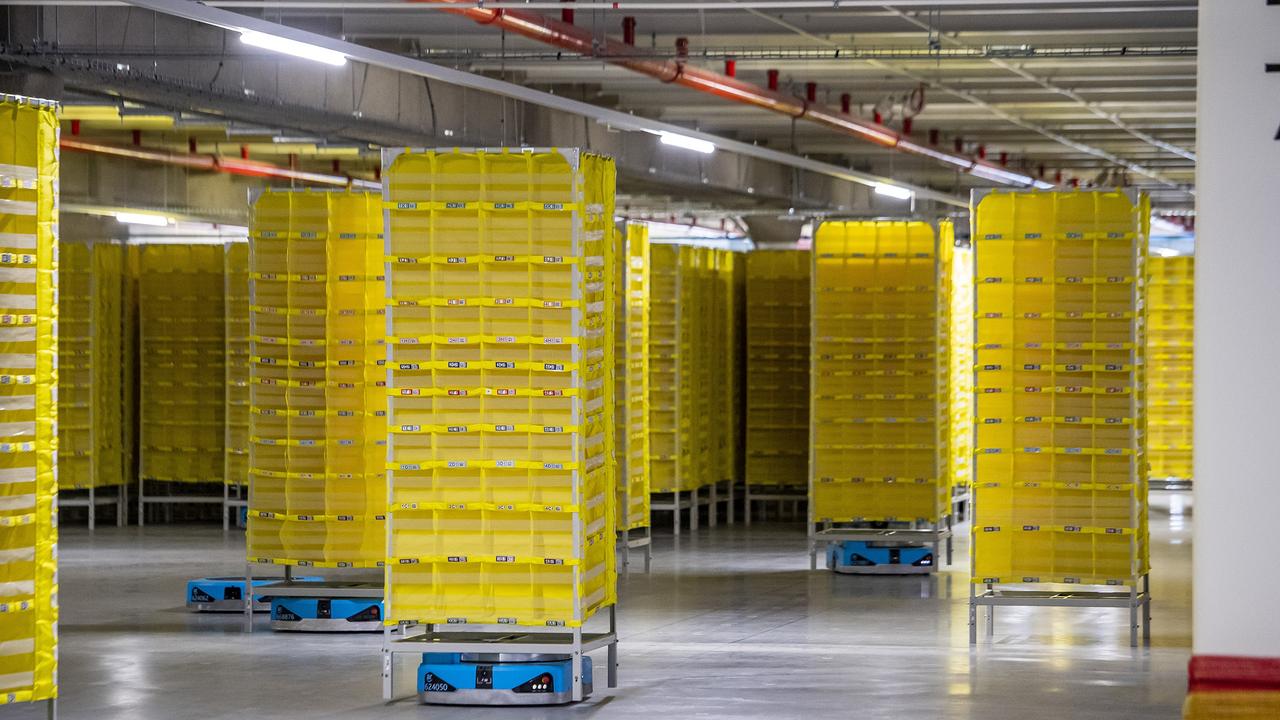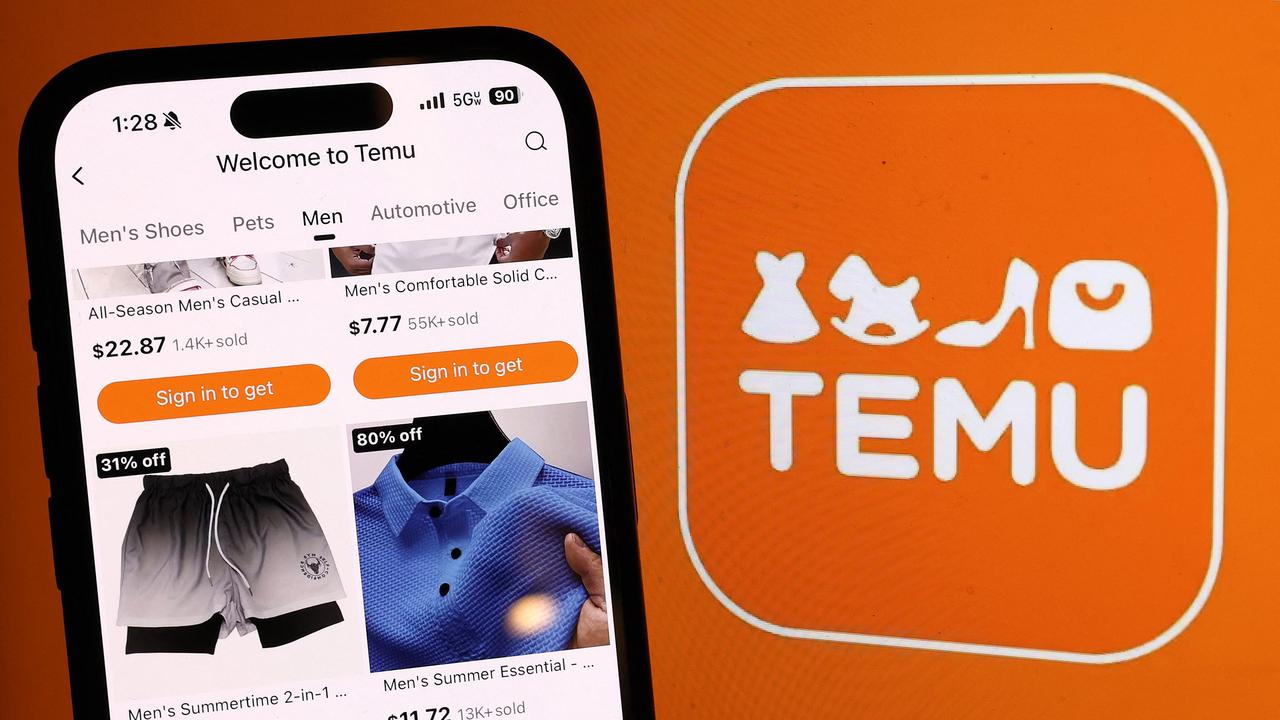China’s takeover of Aussie shopping via Temu, SHEIN: What it means for your data, wallet
Aussies have spent $3 billion with Chinese owned sites SHEIN and Temu in the past year. Economists, cyber security experts and human rights advocates are sounding the alarm.
As the cost of living bites, more and more Australians are turning to Chinese-owned, bargain-priced online shopping sites.
Consumer to manufacturer sites Temu and SHEIN promise extraordinary value by cutting out the middle men in the supply chain with fast fashion, gadgets, homewares and more just a click and a few dollars away.
Temu showed just how deep its pockets were when it spent more than A$10 million on each of the three 30 second ads the company aired during the US Super Bowl in February, a source with knowledge of the rates told CNN.

While the world’s largest e-commerce company Amazon, which dwarfs Temu and SHEIN, is also establishing a larger presence in Australia, there are differences.
US-owned Amazon allows Chinese manufacturers to list their products, but they also have more than 14,000 Australian businesses on-board and employ around 7000 Aussies.
“We expect to invest over $1.6 billion in five new operational sites across Sydney, Melbourne and Brisbane opening between now and Q2 2026, creating more than 4500 jobs once fully operational,” an Amazon spokesperson said.

MANUFACTURING SHIFT
In 1960, manufacturing made up a whopping 29 per cent of Australia’s gross domestic product but now it is a measly six per cent.
With its vast, cheap workforce, China now dominates manufacturing globally in a growing number of sectors, including electric vehicles and fast fashion.
Queensland economist Colin Dwyer is an Adjunct Professor in Economics and Marketing at Townsville’s James Cook University and author of The Travelling Economist and Our Fair Share book series.
Prof Dwyer said Temu and SHEIN had already taken a sizeable chunk out of Australia’s $60 billion retail sector and with Roy Morgan estimating we’ve spent almost $3 billion with them in the past year.

“That’s billions of Aussie dollars and lots of local jobs going overseas,” Prof Dwyer said.
“Every Australian retailer will be affected by success of Temu and SHEIN.
“These platforms have captured a significant market share in a short time. They have a wide base of suppliers that spreads their supply chain risk.

“I expect that over the next 12 months these platforms will capture greater market share of the Australian retail sector as their aggressive marketing campaigns, lower cost items and continuing local cost of living pressures attract new customers.”

Australian Retailers Association CEO ARA Paul Zahra said the influence of these global giants presented a huge local competitive challenge.
“Australian retailers are working hard to compete against these major market disrupters, by focusing on improving their digital marketing and their online purchasing platforms including embracing AI technology,” Mr Zahra said.
“Many retailers are also focusing on promoting the quality and sustainability of their products as an offset against low-quality products.”

AUSTRALIAN GROWTH
SHEIN Australia now has a headquarters in Melbourne, is hosting pop-up stores in capital cities and boasts a high-profile collaboration with Sydney designer Alice McCall.
Temu has local warehouses and both sites have grown sales in Australia by more than 30 per cent in the past year.
SimilarWeb, which monitors the amount of traffic a website receives, states Temu is now in the top five most visited shopping sites in Australia while SHEIN ranks in at the third most popular online clothing retailers.
Marketplace Pulse founder Juozas Kaziukenas has also been monitoring traffic to the sites in Australia and internationally.
“(Temu) will likely get to top three by the end of the year (in Australia) and challenge eBay for the second place in 2025,” Mr Kaziukenas said.
“These are web traffic figures that do not necessarily translate to revenue but they provide a sense of where the market is moving.”

Mr Kaziukenas said his New York based e-commerce intelligence firm’s analysis of the companies suggested they knew their customers well.
“SHEIN showed that direct-from-China for clothing has unique benefits – faster than fast-fashion iteration of designs. By comparison, traditional retail looks only fit to sell clothing pieces that don’t change with trends at all,” Mr Kaziukenas said.
“Temu instead is selling general merchandise goods that don’t become better by having a brand name written on them – from USB cables to kitchen spatulas.
“There are many considerations like environmental impact, over-manufacturing, supply chain resilience, etc. But we can clearly see that this model works well for some products.”
DATA FEARS
So is buying bargain priced, offshore item from a Chinese shopping site like Temu or SHEIN really any different to buying the equivalent from the likes of Kmart?
According to a leading Australian cyber security firm, there is a plausible risk to your personal data when shopping online.

Retail and Entertainment Industry lead for the Australian arm of online security company CyberCX, Alex Hoffmann, said Chineseshopping sites had access to your most sensitive data.
“The reality is that Temu has faced allegations for years that it harvests consumers’ personal data (because of the Chinese government’s ability to extract such detail from businesses on demand) and is the subject of several proposed class-action lawsuits in the United States over how it protects customers personal and financial information,” Mr Hoffmann said.

“Australian consumers should be wary about the data sharing practices and security of shopping apps and websites like Temu and SHEIN.
“It’s a known fact that the information provided to these companies travels well beyond our shores and it’s unclear how and where the data is being stored and of equal consequence, how it’s being used.
“While some information is necessary to make a purchase, it’s less clear where this information is being shared and used by third parties who may be based in China and beyond.”

A Temu spokesperson also confirmed customer data security, quality products were important to them.
“In Australia, our focus is on improving services by offering more relevant products at competitive prices,” the spokesperson said.
“We’ve started working with qualified sellers to ship from local warehouses, reducing delivery times and expanding our product range. We believe these steps will help enhance customer satisfaction and support our growth in the market.”
Temu said it is upfront about any data collection and always informs users if their information will be used for a specific purpose. Its practices follow strict standards set by app marketplaces like Apple’s App Store and Google Play.
“In practice, we only collect what’s needed to operate our service.
“Temu has never shared user data with the Chinese government, and we would not do so if asked.”
SLAVE TRADE?
UNICEF Australia’s Head of International Programs in Child Protection Adrian De Giovanni urged shoppers to look up the Attorney-General’s Modern Slavery Register to ensure their purchase wasn’t contributing to exploitation.
“The prevalence of online shopping means it’s possible Australian consumers are unknowingly supporting businesses who are engaged in unethical practices,” Mr De Giovanni said.

SHEIN Australia has an in-depth listing on the Modern Slavery Register which details their commitment to avoiding the practice.
A SHEIN spokesperson issued a lengthy statement defending their quality, assuring their customer’s data is safe and affirming their stance on prohibiting forced labour.
“SHEIN is very appreciative of the warm welcome we have received in Australia and enjoys strong partnerships with local designers, such as Alice McCall,” the spokesperson said.
How Aussies shopped on Temu and SHEIN last financial year
3.8 million customers bought off Temu
2 million shoppers purchased from SHEIN
More than $1.7 billion spent on Temu
Over $1.1 billion spent at SHEIN
50 per cent of SHEIN customers are under 35
70 per cent of Temu shoppers are over 35
Source: Roy Morgan
How to securely shop online
Create a separate and dedicated email address for online shopping
Only provide the mandatory data and information – ignore “optional” sections
Turn off location sharing
Do not log in through your social media accounts
Delete and clear cookies every time you use an online shopping the app or website
Ship to a PO BOX or AusPost Parcel Locker instead of your home address
Source: CyberCX




